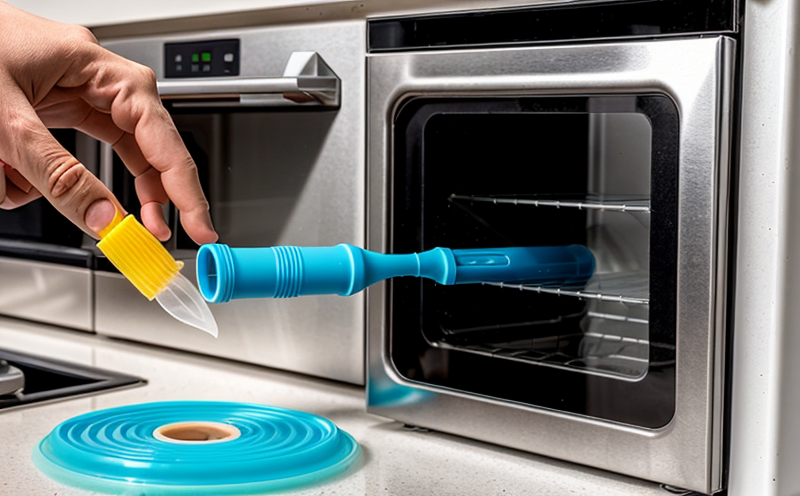ISO 11997 Corrosion Resistance Testing of Coated Household Plastics
The ISO 11997 standard is specifically designed to assess the corrosion resistance of coated household plastics, ensuring that products withstand environmental stressors and meet stringent quality and reliability requirements. This test method evaluates the performance of coatings on plastic materials under controlled conditions intended to mimic real-world exposure to corrosive elements such as salt spray, humidity, and temperature fluctuations.
Coatings are widely used in household plastics to enhance their durability, improve appearance, and provide protection against various environmental factors. These coatings can be made from a variety of materials including acrylics, epoxies, urethanes, or fluoropolymers. The ISO 11997 test ensures that the coating adheres effectively, resists degradation over time, and maintains its protective properties under conditions that household products are likely to encounter.
The testing procedure involves placing coated samples in a specially designed chamber where they are exposed to salt spray for extended periods. This environment simulates the corrosive effects of sea air or industrial environments, which can lead to accelerated corrosion. The test also includes humidity and temperature control to replicate different climatic conditions that household products might face.
Following exposure, the samples undergo detailed examination using various techniques such as visual inspection, cross-sectional analysis, and measurement of coating thickness. Any signs of corrosion or degradation are meticulously documented. This comprehensive assessment provides valuable insights into the performance of coated plastics under real-world conditions.
The results from this test can be crucial for quality managers and compliance officers in ensuring that products meet regulatory standards and industry expectations. It also plays a vital role in R&D efforts, helping engineers refine product designs to enhance durability and reliability. For procurement teams, it offers assurance that the materials they source are of high quality and reliable.
The ISO 11997 test is not just a compliance requirement but an essential tool for manufacturers aiming to improve product performance and customer satisfaction. By adhering to this standard, companies can demonstrate their commitment to producing robust household plastics that withstand environmental challenges effectively.
- Visual inspection
- Cross-sectional analysis
- Measurement of coating thickness
- Salt spray exposure
- Humidity and temperature control
Why Choose This Test
The ISO 11997 test offers several advantages that make it an indispensable tool for manufacturers in the household plastics sector. Firstly, it ensures that coated household plastics meet stringent quality standards, thereby enhancing consumer trust and satisfaction. Secondly, by identifying potential weaknesses early on, this testing method helps reduce costly rework and recalls. Additionally, compliance with ISO 11997 can provide a competitive edge by demonstrating a commitment to product excellence.
The test is particularly beneficial for R&D teams looking to innovate without compromising safety or performance standards. It allows them to experiment with new coating materials and formulations while ensuring that these changes do not adversely affect the overall integrity of the plastic material. For procurement departments, it ensures they are sourcing high-quality raw materials that will perform reliably under various conditions.
Moreover, ISO 11997 testing can help companies navigate increasingly stringent environmental regulations by providing data that supports sustainable and eco-friendly practices. By ensuring that coated household plastics have excellent corrosion resistance, manufacturers contribute to reducing waste and extending the lifespan of products, which ultimately benefits both the environment and consumers.
Finally, the test provides a benchmark against which performance can be consistently measured, offering valuable feedback for continuous improvement. This iterative process ensures that products are continually optimized to meet evolving market demands and consumer expectations.
Quality and Reliability Assurance
- Data Accuracy: Rigorous adherence to ISO 11997 ensures precise measurement of coating integrity, minimizing errors and inconsistencies.
- Consistent Results: Standardized testing methods provide repeatable results across different batches or samples.
- Compliance Verification: Ensures that products meet regulatory requirements and industry standards.
- Durability Improvement: Identifies areas of potential failure, allowing for targeted improvements in product design and manufacturing processes.
The ISO 11997 test is instrumental in maintaining high-quality standards across the household plastics sector. By providing accurate, consistent, and compliant results, it supports manufacturers in delivering reliable products that meet both internal quality targets and external regulatory requirements. This robust testing method fosters trust among consumers and strengthens a company's reputation for product excellence.
Competitive Advantage and Market Impact
The ISO 11997 test offers significant competitive advantages in the household plastics market by ensuring that products not only meet but exceed industry expectations. In an increasingly demanding market where consumers are becoming more discerning about product quality, durability, and environmental impact, this test can be a decisive factor in standing out from competitors.
By demonstrating robust corrosion resistance through ISO 11997 testing, companies can differentiate their products by offering superior performance and reliability. This differentiation can lead to increased market share as customers gravitate towards brands that prioritize quality and sustainability.
The test also supports a company's efforts in environmental stewardship, contributing positively to the broader conversation around sustainable practices within the industry. By reducing waste through more durable products, manufacturers align themselves with growing consumer preferences for eco-friendly options. This alignment can enhance brand image and foster loyalty among environmentally conscious consumers.
Furthermore, compliance with ISO 11997 can open new market opportunities by enabling companies to participate in international trade or bid on government contracts that require stringent quality assurance measures. The test results serve as a reliable indicator of product performance, which is crucial for winning competitive bids and expanding into global markets.
In conclusion, the ISO 11997 test plays a pivotal role in enhancing market competitiveness by ensuring product reliability, supporting sustainability initiatives, and opening up new business opportunities. It is an essential tool for manufacturers aiming to maintain their position at the forefront of the household plastics sector.





